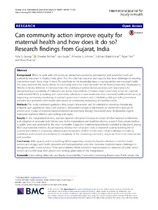| dc.contributor.author | George, Asha S. | |
| dc.contributor.author | Mohan, Diwakar | |
| dc.contributor.author | Gupta, Jaya | |
| dc.contributor.author | LeFevre, Amnesty E. | |
| dc.contributor.author | Balakrishnan, Subhasri | |
| dc.contributor.author | Ved, Rajani | |
| dc.contributor.author | Khanna, Renu | |
| dc.date.accessioned | 2018-09-04T13:20:33Z | |
| dc.date.available | 2018-09-04T13:20:33Z | |
| dc.date.issued | 2018 | |
| dc.identifier.citation | George, A.S. et al. Can community action improve equity for maternal health and how does it do so? Research findings from Gujarat, India. International Journal for Equity in Health, 17: 125 | en_US |
| dc.identifier.issn | 1475-9276 | |
| dc.identifier.uri | https://doi.org/10.1186/s12939-018-0838-5 | |
| dc.identifier.uri | http://hdl.handle.net/10566/4012 | |
| dc.description.abstract | BACKGROUND: Efforts to work with civil society to strengthen community participation and action for health are
particularly important in Gujarat, India, given that the state has resources and capacity, but faces challenges in ensuring
that services reach those most in need. To contribute to the knowledge base on accountability and maternal health,
this study examines the equity effects of community action for maternal health led by Non-Government Organizations
(NGOs) on facility deliveries. It then examines the underlying implementation processes with implications for
strengthening accountability of maternity care across three districts of Gujarat, India. Community action for maternal
health entailed NGOs a) working with community collectives to raise awareness about maternal health entitlements, b)
supporting community monitoring of outreach government services, and c) facilitating dialogue with government
providers and authorities with report cards based on community monitoring of maternal health.
METHODS: The study combined qualitative data (project documents and 56 stakeholder interviews thematically
analyzed) with quantitative data (2395 women's self-reported receipt of information on entitlements and use of
services over 3 years of implementation monitored prospectively through household visits). Multivariable logistic
regression examined delivery care seeking and equity.
RESULTS: In the marginalised districts, women reported substantial increases in receipt of information of entitlements
and utilization of antenatal and delivery care. In the marginalized and wealthier districts, a switch from private facilities
to public ones was observed for the most vulnerable. Supportive implementation factors included a) alignment among
NGO organizational missions, b) participatory development of project tools, c) repeated capacity building and d)
government interest in improving utilization and recognition of NGO contributions. Initial challenges included a)
confidence and turnover of volunteers, b) complexity of the monitoring tool and c) scepticism from both communities
and providers.
CONCLUSION: With capacity and trust building, NGOs supporting community based collectives to monitor health
services and engage with health providers and local authorities, over time overcame implementation challenges to
strengthen public sector services. These accountability efforts resulted in improvements in utilisation of public sector
services and a shift away from private care seeking, particularly for the marginalised. | en_US |
| dc.language.iso | en | en_US |
| dc.publisher | BMC | en_US |
| dc.rights | © The Author(s). 2018 Open Access This article is distributed under the terms of the Creative Commons Attribution 4.0
International License (http://creativecommons.org/licenses/by/4.0/), which permits unrestricted use, distribution, and
reproduction in any medium, provided you give appropriate credit to the original author(s) and the source, provide a link to
the Creative Commons license, and indicate if changes were made. The Creative Commons Public Domain Dedication waiver
(http://creativecommons.org/publicdomain/zero/1.0/) applies to the data made available in this article, unless otherwise stated. | |
| dc.subject | Care-seeking | en_US |
| dc.subject | Maternity care | en_US |
| dc.subject | Equity | en_US |
| dc.subject | Accountability | en_US |
| dc.subject | Community monitoring | en_US |
| dc.subject | Report cards | en_US |
| dc.subject | Public-private mix | en_US |
| dc.title | Can community action improve equity for maternal health and how does it do so? Research findings from Gujarat, India | en_US |
| dc.type | Article | en_US |
| dc.privacy.showsubmitter | FALSE | |
| dc.status.ispeerreviewed | TRUE | |

